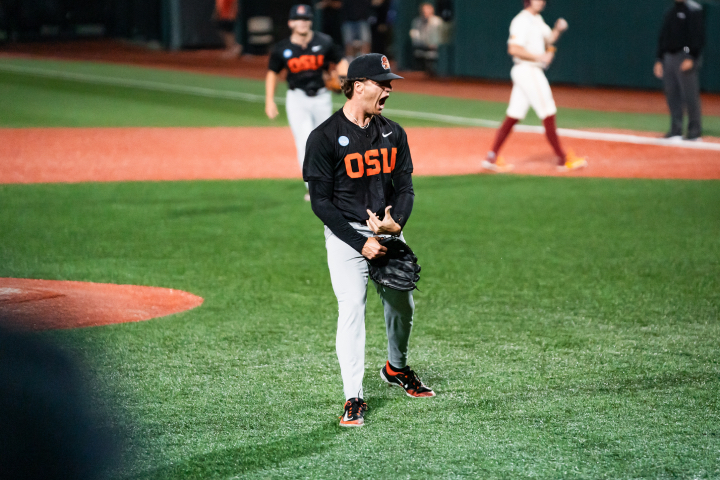OSU graduate employees strike
Published 7:04 am Wednesday, November 13, 2024

- Oregon State University graduate students and supporters join the Coalition of Graduate Employees on the Memorial Union quad in Corvallis seeking to renegotiate a contract.
Hundreds of graduate students circled the quad outside of Oregon State University’s Memorial Union in Corvallis on Tuesday morning.
They held signs that displayed phrases such as “OSU works because we do” and “we can’t eat thesis credit.”
Marching to the rhythm of a singular drum, they chanted phrases such as “ready to fight? Damn right!” and “Emily Farrell, rich and rude, we don’t like your attitude” — referring to OSU’s director of employee labor relations.
Graduate employees at Oregon State University, including graduate teaching assistants and researchers, are on strike in what appears to be the first time in their union’s 25-year history. The demonstration Tuesday was massive — a rumor even spread among participants that it was the largest on campus since the war in Afghanistan.
The color pink proliferated, the chosen hue for the Coalition of Graduate Employees — pink neon vests, pink sign emblems and even pink shirts with “Solidarity” written in the Mattel Barbie font.
Over the last year, “CGE has seen a huge increase in membership, a huge increase in participation,” coalition President Austin Bosgraaf said. “That’s how we were able to pull this off today.
“We are hopeful that, with all this extra power that we have, we can get this contract soon.”
A spokesperson for OSU-Cascades in Bend said the campus had a “handful” of graduate student employees represented by the union. It was unclear if they were also striking.
Talks began last year
Negotiations over a new contract began last year, and compensation has remained a sticking point. After reaching an impasse, OSU graduate students voted overwhelmingly for a strike — 90% of members participated in the vote and 93% voted in favor.
“We are disappointed at this outcome but continue to be open to additional bargaining sessions in order to reach a sustainable contract with CGE,” OSU officials said in a statement Tuesday. The university bargaining team and Coalition of Graduate Employees met most recently Monday and are set to meet again on Thursday.
Erika Stewart, the coalition’s vice president for communications, said that negotiating with OSU has been “awful.”
“We’ve been in openly combative negotiations for over a year,” they said.
By contrast, the graduate students were feeling a sense of support from the student and faculty during the morning’s demonstration, they said.
Sophie Reynolds, a third-year undergraduate student studying education, looked on from the entrance of the Memorial Union as graduate employees marched across the quad below her. She said she “100%” supports the strike.
“I can’t imagine how much work they’re doing,” she said. “And, like, barely getting paid for it.”
‘Not enough’
Graduate employees are currently asking for a 40% increase — down from a previous request for 50% — to their minimum monthly-full-time equivalent salary rate, which is presently about $2,100.
“For graduate employees to continue to be able to simply survive in the city of their employment, salary increases are absolutely essential,” the Coalition of Graduate Employees wrote in a statement of intent to strike. Corvallis is consistently ranked the most rent-burdened city in the state.
Graduate employees have a variety of responsibilities that include grading student assignments, hosting office hours and leading their own courses. Workloads vary by department.
The university is currently proposing a 14% cumulative salary increase — slightly up from prior negotiations — over four years.
Union members Monique Lanier, Tor Strand and Nicolette Ratz stood on the sidelines as the crowd continued circling and chanting, all three of them holding coalition signs. Lanier and Strand are part of OSU’s poetry Master of Fine Arts program. They teach introductory writing and poetry classes, where they are responsible for curriculum development and grading.
“We’re not TAs (teachers assistants),” Strand said. “We’re the instructor of record.” Ratz works in the communications department for the College of Engineering.
All three agree that what they are paid by the university is not enough.
“It doesn’t even cover rent,” Lanier said, “let alone food.” She takes out loans to make it work, and Strand has spent time at his old job throughout the program.
“We love our students. We love our jobs. We love to study,” Lanier said. “And we want to be able to do that, to give it our best effort.”
Vital to the system
Mary Beisiegel, a professor in the mathematics department, said she is proud of graduate students for coming together and rallying around the issue of pay.
“They do a lot of work — I don’t know how we’d get by without them,” she said. “And they’re just remarkable with undergrads.”
Professors, especially as they get older, she said, can get increasingly out-of-touch.
“To have somebody closer in age, closer in energy, being able to share their passion about mathematics with the undergrads — it’s pretty awesome,” she said.
Her differential calculus course will be impacted by the strike, she said, as a graduate teaching assistant is responsible for part of the course. Stewart said that OSU has not been providing departments or colleges with information about how to navigate the strike.
In addition to vying for increased pay, graduate employees also want a contract that lasts four years — as in previous agreements — but with language that allows the contract to be reopened after two years for renegotiation.
But the university is currently proposing a four-year agreement with no reopener language — and that’s down from a proposal for a five-year agreement.
“They’re willing to sustain a strike, disrupt undergrad education, disrupt people’s wages and lives — just to disenfranchise us from negotiating as often as we have been for years,” Stewart said.
“We’re asking for a contract that we have had for over 20 years, and they’re refusing to give even that to us.”
It’s up to OSU, they said, when this strike will end — the coalition is willing to stick it out as long as necessary to obtain the contract it has been fighting for. Union organizers and members hope that collective power demonstrated by the strike will change the dialogue and result in a better outcome for graduate students.
“The university has fundamentally miscalculated the impact that this amount of withheld labor will have on their operations, on their students,” said Brandi Whiteaker, the union’s vice president for bargaining. She’s hopeful, but at the same time her experience working with OSU has been, to some degree, disheartening.
“The administrative perspective is just so rooted in the status quo,” she said. “They will say that they want to keep the institution alive, that they have a financial responsibility to the public, and it’s not balanced right.
”I mean, their strategic plan is called prosperity widely shared,” she continued. “Shared where?”






